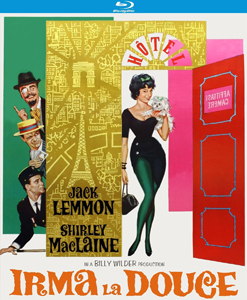Billy Wilder returns to the winning ingredients of Jack Lemmon, Shirley MacLaine, false identities and envelope-pushing sex-based comedy for “Irma la Douce” (1963). Laugh-out-loud funny for much of its runtime, the filmmakers ultimately like the romp a little more than I do, as it bizarrely goes on for 2 hours and 27 minutes! But it doesn’t lose my goodwill.
Co-writing with usual writing partner I.A.L. Diamond from a 1956 play by Alexandre Breffort, Wilder deftly weaves a mainstream comedy out of prostitution, an extremely taboo issue at the time. It’s set in Paris to match with the play and provide a believably socially progressive setting, although Wilder asks no actors to truly play French.
It stays on the razor edge of believability for quite a while, starting with the introduction of Lemmon as beat cop Nestor – the most ridiculous beat-cop casting prior to Sean Connery in “The Untouchables,” but forgiven because it’s purposeful. The laughs soon ensue.

“Irma la Douce” (1963)
Director: Billy Wilder
Writers: Billy Wilder, I.A.L. Diamond (screenplay); Alexandre Breffort (play)
Stars: Jack Lemmon, Shirley MacLaine, Lou Jacobi
We’ve already been taken through the ins and outs of prostitution row a block over from the bustling grocery market; it’s like Hitchcock’s “Rear Window” setting of hidden vice except we’re on the ground to see the vice. We also see the perfect economic circle, as outlined by Lou Jacobi’s bartender Moustache, a former economics professor (one of his many former jobs, as we’ll learn to our amusement): grocery workers pay prostitutes, prostitutes pay pimps, pimps bribe cops, cops buy groceries.
The titular prostitute’s name means Irma the Sweet, but Nestor is really the sweet-hearted, naïve one. He raids the operation on his first day, thus getting himself fired. (Among other reasons why Paris doesn’t truly want to enforce this moral law: The police chief is a client of prostitute row.)
Another Lemmon-MacLaine winner
At the risk of redundancy from my review of “The Apartment,” Lemmon is likeable as the Everyman who is down on his luck yet sprightly. And MacLaine has a knack for initially seeming like she’s bored with being on the set, but it’s as good a place to be as any, and she’s so cute that we’re happy to wait for her to get into it. Gradually we realize Irma is merely world-weary, and she actually has the enthusiasm for life to match Nestor’s.
This is a purer comedy than “The Apartment,” and MacLaine is an ideal straight woman to play across from Lemmon. After Irma and Nestor fall in love and into shared quarters in the quick fashion of old plays, Nestor is irked that she’s bringing home the bacon by having sex with dozens upon dozens of men who aren’t him, so he devises the British character Lord X to be her lone, rich client.

“Some Like It Hot” got laughs from the purposeful unbelievability of Lemmon as a woman, but here he disappears into Lord X so thoroughly that I’d be fooled too if I wasn’t let in on the scheme (which Moustache helps him with). Lord X is like “Family Guy’s” parody of Britishers, with the false teeth giving Lemmon a head start.
The scheme is of the “so stupid it’s brilliant” variety, as Moustache lends 500 francs to Nestor (as Lord X) to pay Irma, who will then give it to Nestor (who is technically Irma’s pimp, in addition to her boyfriend), who will then give it back to Moustache. Then Nestor will make money by sneaking out and hauling around pigs and other meat and actually bringing home the bacon.
Every expected pitfall and pratfall comes up, along with delightful surprises. Although it takes too long, I like the clever manner in which Nestor (and the story) gets out of a serious legal scrape. “Irma” concludes with its most improbable joke; if it had gone on another 5 minutes, the characters would probably blast into space.
Pay (and laugh) up front
But I was laughing the most as the premise is laid out. Wilder sets up an absurd but plausible playground I know I’m going to have fun in, while peppering in observations about the silliness of societal constructs.
The director is a sane person comfortable in insane worlds, and while his surrogates (often played by Lemmon) aren’t as comfortable, they have to play the game. A great line of dialog from Moustache sums up Nestor’s situation, and that of many Wilder characters (and any book-smart but not street-smart viewer): “To be honest in a dishonest world is like plucking a chicken against the wind. You’ll only wind up with a mouthful of feathers.”
This is like Danny DeVito’s line from “Heist” (“Everybody needs money. That’s why they call it money”) and Norm’s line from “Cheers” (“It’s a dog-eat-dog world, and I’m wearing Milk-Bone underwear”). It’s a technically stupid yet totally on-point statement wherein the brilliant metaphor never materializes, yet the meaning is not hampered.
The purest description of money is “money” (which, after the noun was invented, also became an adjective), we say dogs eat dogs but we know they truly prefer Milk-Bone treats, and the more accurate parallel to a literal mouthful of feathers is a metaphorical mouthful of feathers. Being surrounded by traditional wit in the script, the witless line is so unclever it’s clever. (And indeed, Nestor later needs a cognac to wash down “the taste of feathers.”)
Even Wilder’s genius can’t justify a comedy that cruises beyond the 2-hour mark; doesn’t he know the hotel on prostitute row charges by the hour, and they don’t allow suitcases? But there are worse people to spend this amount of time with than Lemmon and MacLaine.
Wilder Wednesdays looks at the films of legendary writer-director Billy Wilder.

